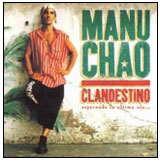Music |
Manu Chao and the Most Popular Song in the World
By
Published: Aug 06, 2017
Category:
World
The most popular song in the world? The New York Times reports that it’s “Despacito,” an upbeat Latin dance song that’s about hot fun of the adult variety. How often has the YouTube video been viewed? Try 3 billion. Click and be one more…
The song is infectious. Hard to imagine not tapping your feet. Orr even getting up to dance. One thing, though, nagged at me: I felt I’d heard something like it before. And then I twigged: Manu Chao. “Clandestino.” Listen. See what I mean?
Manu Chao? His father, a Spanish journalist, was sentenced to death by Franco; the family sensibly relocated to Paris. Chao grew up with an international sensibility, and it was only natural that his first band would travel to South America, playing for people who don’t buy tickets to concerts. And how about this for blunt force trauma to pretty much everything we know as politics. One of his best songs:
I first heard Chao the summer we created the child. We were in Rome, and out of every shop came one song: “Me gusts tu” — a song that, 15 years later, Barack Obama would put on this summer playlist. The music ruled: an irresistible melody and a killer rhythm. The lyrics were… goofy. Chao simply listed all the things he loved: travel, the wind, the sea, running, marijuana, Colombia — and you. It’s jaunty, optimistic music, smart in the conception and cheerfully dumb in the car or on the beach.
Try it. Bet you like it.
The only Chao CD you can buy new is “La Radiolina.” Some of these songs are variations of the classic Chao riff. True. But not sad — you don’t know the others. So think of these as Manu’s Greatest Hits. [To buy the CD of “La Radiolina” from Amazon, click here.]
Manu Chao may be a successor to Bob Marley, but reggae is just the start of his music. He sings in English, Spanish, Galician, Portuguese, French and Arabic — sometimes in the same song. He conceives his CDs as seamless, connecting songs with sirens and street noise. And he’s an unashamed loudmouth. But not a heavy-handed one. Chao casts himself as a goofball who makes fun music for everyone — he’s the class clown who never grew up. So he creates danceable tunes that just happen to get the proletariat shaking a fist at globalization and imperialism. Consider the song that put him on the map: “Bongo Bong.” It’s the story of a guy who starts "bangin’ on my bongo" in the jungle and soon finds himself in "the big town" where he’s the "King of Bongo"
They say that I’m a clown, making too much dirty sound
They say there is no place for a monkey in this town
There’s also, for the graduate students in the audience, a probable double meaning for “bong”, but who cares? Your feet are moving; if you’re not careful, you’re going to jump up and throw yourself around.
From the first time I heard it, I’ve been a zealot for Amadou & Mariam’s Dimanche a Bamako — a mock Sunday in the center of Mali’s capital city, with sirens, kids, trucks and the remarkable songs of this blind guitarist and his blind wife. It’s the happiest music I know, and Manu Chao is largely responsible for conceiving it and producing it.
It’s a fabulous irony – and a hoary cliche — that music from the streets happens to sound great at country clubs, on the beach, and over the sound systems of expensive cars. The lifeguard who’s listening to Bob Marley might, some day, be grooving to Manu Chao. If you’re smart, you’ll get there first.
And then you can say something smart about the most popular song in the world.


